154 scholarly books by Diaphanes and 7
start with R
154 scholarly books by Diaphanes and 7
154 scholarly books by Diaphanes
7 start with R start with R
7 start with R start with R
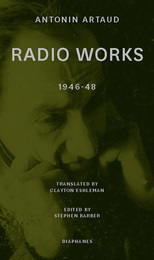
Radio Works
1946-48
Antonin Artaud
Diaphanes, 2020
Following his release from the Rodez asylum, Antonin Artaud decided he wanted his new work to connect with a vast public audience, and he chose to record radio broadcasts in order to carry through that aim. That determination led him to his most experimental and incendiary project, To Have Done with the Judgement of God, 1947-48, in which he attempted to create a new language of texts, screams, and cacophonies: a language designed to be heard by millions, aimed, as Artaud said, for “road-menders.” In the broadcast, he interrogated corporeality and introduced the idea of the “body without organs,” crucial to the later work of Deleuze and Guattari. The broadcast, commissioned by the French national radio station, was banned shortly before its planned transmission, much to Artaud’s fury. This volume collects all of the texts for To Have Done with the Judgement of God, together with several of the letters Artaud wrote to friends and enemies in the short period between his work’s censorship and his death. Also included is the text of an earlier broadcast from 1946, Madness and Black Magic, written as a manifesto prefiguring his subsequent broadcast. Clayton Eshleman’s extraordinary translations of the broadcasts activate these works in their extreme provocation.
[more]
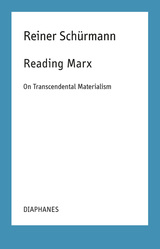
Reading Marx
On Transcendental Materialism
Reiner Schürmann
Diaphanes, 2020
In this book, Reiner Schürmann argues that what is most original about Marx is his philosophical axis. Extending his highly original engagement with the history of philosophy, Schürmann draws out this axis, which determines and localizes his theories of history, social relations, and economy. Whereas Marxist readings of Marx conceive history, classes, and social relations as primary realities, Schürmann brings out a radically immanent understanding of praxis that introduces multiplicity. This edition is complemented by a reprinting of Schürmann’s Anti-Humanism essay, in which he reads Marx alongside Nietzsche and Heidegger as spelling out the dissociation of being and action. Reading Marx showcases underappreciated facets of Schürmann’s work and offers an interpretation of Marx that resonates with the readings of Jacques Derrida, Michel Henry, Antonio Negri, and François Laruelle.
[more]
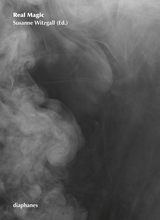
Real Magic
Edited by Susanne Witzgall
Diaphanes, 2018
In Western societies a newly discovered and very lively interest in magical practices and occult knowledge can be witnessed. The magical seems to be evolving into a popular phenomenon that affects society as a whole and is also becoming the subject of intense debate in artistic and academic-scientific contexts. The book Real Magic investigates the current realities of the magical in the contemporary arts, sciences and everyday culture. It explores the present Western residues and forms of magical practices, the current potentials of magical perception and thinking in a world largely determined by financialised instrumental reason, and also the drawbacks of occultism. The publication is the result of the fourth annual programme of the cx centre of interdisciplinary studies at the Academy of Fine Arts Munich.
[more]
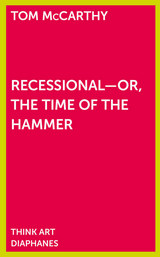
Recessional - Or, the Time of the Hammer
Tom McCarthy
Diaphanes, 2016
Modernist and contemporary literature are marked by a preoccupation with time, specifically with the passage of time characterized by starts and stops and suspended states of waiting. Acclaimed novelist Tom McCarthy brings out a temporal pattern, a subliminal convention of a certain fringe of modernism that works both in and against the canon of modernist literature in works by Thomas Pynchon, J. G. Ballard, Maurice Blanchot, Thomas Mann, Joseph Conrad, James Joyce, and William Faulkner, as well as in McCarthy’s own fiction.
The latest edition in Diaphanes’s THINK ART series, which explores the cultural and theoretical impact of artistic processes, Recessional—Or, the Time of the Hammer opens with an essay by McCarthy on recessional time as an aesthetic element and literary device. This essay is followed by an interview with McCarthy, in which he further discusses his own writing process, taking his most recent novel, Satin Island, as the starting point and casting new light on both avant-garde and realist literature.
Praise for Remainder
“An avant-garde challenge. . . . [McCarthy is] one of the great English novelists of the past ten years.”—Zadie Smith
The latest edition in Diaphanes’s THINK ART series, which explores the cultural and theoretical impact of artistic processes, Recessional—Or, the Time of the Hammer opens with an essay by McCarthy on recessional time as an aesthetic element and literary device. This essay is followed by an interview with McCarthy, in which he further discusses his own writing process, taking his most recent novel, Satin Island, as the starting point and casting new light on both avant-garde and realist literature.
Praise for Remainder
“An avant-garde challenge. . . . [McCarthy is] one of the great English novelists of the past ten years.”—Zadie Smith
[more]
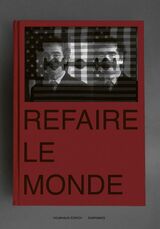
Refaire le monde
Edited by Simon Maurer and Daniel Morgenthaler
Diaphanes, 2021
Staging an exhibition as choreography, as drama, as opera, as a place where reality, politics, aesthetics, art, film, and music can address the issues of our day through documentaries, dialogues, science, activism, and creativity: This is the dream, the idea, and the mission of the “refaire le monde” exhibition trilogy at Helmhaus Zürich.
The exhibition involves some eighty different authorial voices, bringing diverse attitudes and actions into the safe space of the museum. This book is both a documentation of these new values and new worlds and a guide to them. It is people-focused, positing the arts as the model for a new human reality. Refaire le monde features many artists, including: Ursula Biemann, Pascale Birchler, Corina Gamma, Vincent Glanzmann, Fabrice Gygi, A. C. Kupper, Asia Andrzejka Merlin, Gianni Motti, Tanja Roscic, Heidi Specogna, Bertold Stallmach, and many more, as well as all those who participated in various parallel events.
The exhibition involves some eighty different authorial voices, bringing diverse attitudes and actions into the safe space of the museum. This book is both a documentation of these new values and new worlds and a guide to them. It is people-focused, positing the arts as the model for a new human reality. Refaire le monde features many artists, including: Ursula Biemann, Pascale Birchler, Corina Gamma, Vincent Glanzmann, Fabrice Gygi, A. C. Kupper, Asia Andrzejka Merlin, Gianni Motti, Tanja Roscic, Heidi Specogna, Bertold Stallmach, and many more, as well as all those who participated in various parallel events.
[more]
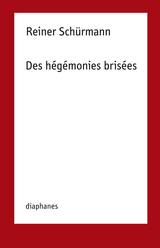
Reiner Schürmann
Des hégémonies brisées
Reiner Schürmann
Diaphanes, 2017
Le b-a ba du métier n’est-il pas d’assurer un fondement, non-fondé mais capable néanmoins d’ancrer les prémisses m’instruisant sur ce que je puis savoir et sur ce que je dois faire ? Comprise ainsi, la norme ne se justifie pas ; en quoi elle est fantasmatique. Mais elle justifie tout ce qui peut devenir phénomène pendant l’époque linguistique à laquelle elle imprime sa marque ; en quoi elle est hégémonique. S’il s’avère qu’un tel référent non-référable à quelque instance supérieure se maintient tant que prédomine une langue, alors l’histoire à retracer sera celle des fantasmes hégémoniques grec, latin, et moderne. Un fantasme est hégémonique quand toute une culture s’y fie comme si elle tenait là au nom de quoi parler et agir. Pareil représenté-chef (hêgemôn) travaille le singulier qui est indicible, en le disant part d’un tout. Les hégémonies tournent le singulier en du particulier.
Il s’agira donc de retracer une histoire de soumissions par nous-mêmes encourues.
Il s’agira donc de retracer une histoire de soumissions par nous-mêmes encourues.
[more]
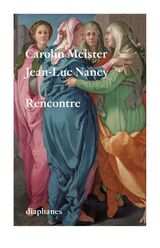
Rencontre
Carolin Meister and Jean-Luc Nancy
Diaphanes, 2021
D’une rencontre est né un dialogue au sujet de la rencontre : un étonnement partagé de la possibilité qu’ait lieu l’incalculable, l’imprévisible et l’irréductible. Une curiosité pour la justesse de ce qui n’a été ni concerté ni décidé.
Hasard, providence, intrication quantique, rituel, animisme, étreinte ou porosité, pensée ou art sont autant de tentatives de tourner autour de ce qui nous échappe quand nous nous rencontrons. Et autant de façons de se rencontrer là où la philosophie reconnait que l’art lui échappe.
Hasard, providence, intrication quantique, rituel, animisme, étreinte ou porosité, pensée ou art sont autant de tentatives de tourner autour de ce qui nous échappe quand nous nous rencontrons. Et autant de façons de se rencontrer là où la philosophie reconnait que l’art lui échappe.
[more]
READERS
Browse our collection.
PUBLISHERS
See BiblioVault's publisher services.
STUDENT SERVICES
Files for college accessibility offices.
UChicago Accessibility Resources
home | accessibility | search | about | contact us
BiblioVault ® 2001 - 2024
The University of Chicago Press









